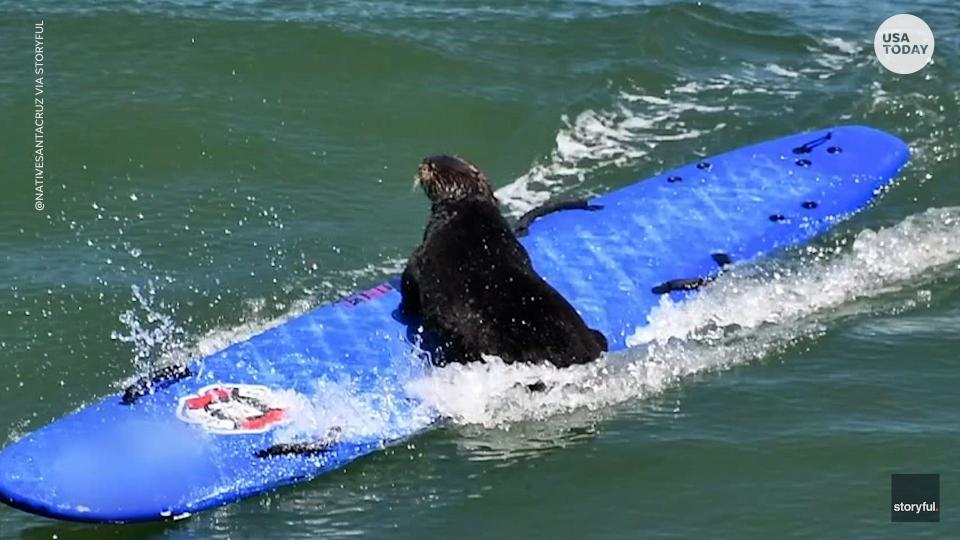Grand theft otter: Surfboard-stealing sea otter may be in danger. Are humans to blame?
The high jinks of a 5-year-old southern sea otter who likes to steal surfboards off the coast of California have attracted international attention, endangered people and put the otter's life at risk. And experts say there's good reason to believe humans are to blame for the animal's odd behavior.
The sea otter has repeatedly approached surfers and essentially stolen their surfboards off the coast of Santa Cruz in recent months. In documented incidents, the otter — dubbed Otter 841 — pawed and pried surfboards away from people and chomped down hard on their edges, damaging the boards.
There have been no confirmed reports of Otter 841 injuring a human, according to the U.S. Fish and Wildlife Service, but experts fear the close encounters with humans could be dangerous to both species. Multiple experts told USA TODAY that a bite could not only harm a person but could lead officials to euthanize Otter 841.
If and when search teams capture her, Otter 841 will spend the rest of her life in captivity, away from the natural population.
The otter's behavior is unusual, but it follows a familiar pattern, some experts say. Oftentimes when wild animals begin approaching humans in unusual ways, there is "clear evidence that there was some human interaction where they formed a positive association and eventually lost their fear of people," said Kevin Connor, communications director at the Monterey Bay Aquarium.
When any wild animal loses its "natural inclination" to avoid humans, it usually starts off as fun, unusual or benign for the human, said Gena Bentall, a sea otter biologist who researches how to protect the animals and their habitats.
"She jumps up on someone's surfboard and sits there for a while and has a positive experience with that, and over time that builds to a positive association with surfboards," Bentall said.
But in the end, the animal can end up paying a steep price, especially more dangerous animals.
"The human may get a bite, but the otters are going to be removed from the population and that's what's going to happen with this girl," Bentall said.
Mother of California otter also removed from wild after interacting with humans
The otter's own mother is an example of a wild animal that was removed from the wild for behavior traced to humans.
Otter 841's mother, Otter 723, was herself removed from the ocean after she started climbing aboard kayaks in search of tasty treats from humans, Connor confirmed to USA TODAY. Researchers found evidence that her behavior developed after numerous positive interactions with people.
After ending up at the Marine Wildlife Veterinary Care and Research Center in Santa Cruz, Otter 723 gave birth to Otter 841.
But experts at the Monterey Bay Aquarium say the hereditary connection is very likely a coincidence.
Why did the Santa Cruz otter lose her natural fear of humans?
It will likely remain unclear exactly what led Otter 841 to lose her natural fear of humans, Connor said.
“We don’t have any clear evidence for why this otter’s behavior is ... atypical," he said. "We don’t know what could have done this to this specific otter.”
But history shows a pattern of how human behavior influenced these wild animals.
For centuries, colonizers on the American west coast hunted sea otters, almost driving them to extinction, according to the U.S. Fish and Wildlife Service. That dominant interaction between the hunters and the hunted led to southern sea otters having a natural fear of getting too close to humans.
These days however, southern sea otters can act aggressively towards humans for the following reasons, according to wildlife experts:
Hormonal changes due to pregnancy or other biological processes
Repeated interactions with people that give the animal a positive association with humans

Humans interfering with wildlife often harms animals
“There are lessons here that we can take away from the story of Otter 841 and all the interactions she’s had with people," Connor said. "It is something you can point to and say, ‘this otter had to be taken from the wild because she lost her fear of people.’”
In May, Yellowstone National Park staff euthanized a newborn bison after a visitor "intentionally disturbed" the calf, causing its herd to reject the baby, park officials said.
In 2021, wildlife managers intentionally killed a grizzly bear in Grand Teton National Park they said had become a safety risk after it got used to getting food from humans.
Contributing: Emily DeLetter, USA TODAY
This article originally appeared on USA TODAY: Why the Santa Cruz surf board-stealing sea otter may be in danger

